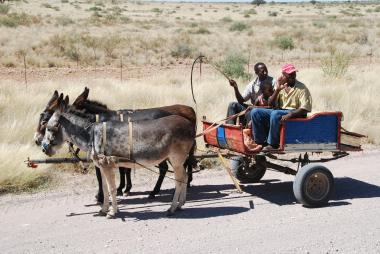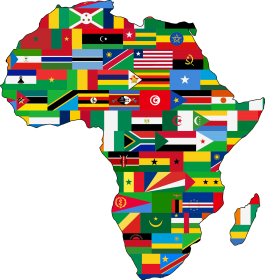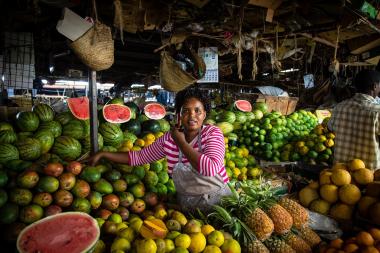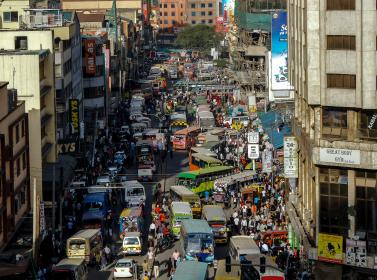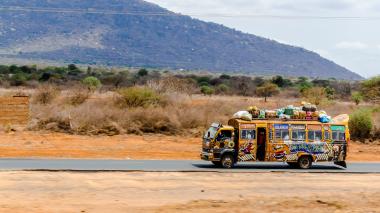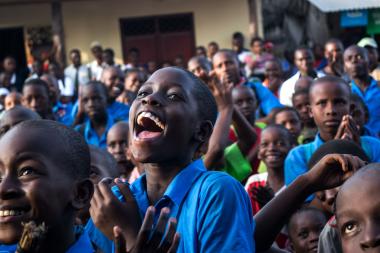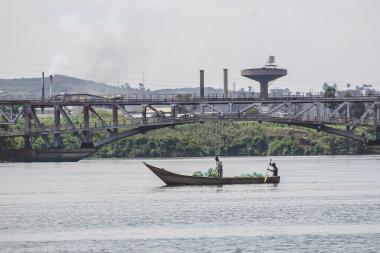CHINESE ENGAGEMENT IN EAST AFRICA UNDERGOING CHANGE
Cooperation and local production the new trend
Nairobi (GTAI) - China dominates infrastructure projects and the construction industry in East Africa. But now the Kingdom of the Middle is also intensifying its commitment in trade and industry.
The Chinese advance in East Africa is breathtakingly fast, focused, efficient and highly successful. The approach is simple: one makes a business proposal that meets the wishes of the decision-makers, brings everything with you, including financing, and the project will be brought out with Confucian efficiency.
Because the customer is satisfied, follow-up orders are being placed. And the more orders there are, the more Chinese activities are there that no longer have anything to do with the original project: Trade, housing construction and business start-ups. And the more the debt with Chinese financiers rises, the more their interest grows in ensuring that the debt can be serviced.
China is fast - on its terms
In Kenya, the Chinese breakthrough came with the comparatively short road from Nairobi to Thika. The international donor community was willing to finance a road construction project, but only at the usual terms, such as regular feasibility studies and tenders, but at favorable interest rates. During the term of office of the former acting President at the time, all this would not have been completed.
Meanwhile, the Chinese made a different offer: shortest construction time and commercial credit with free hand and political backing. Residence permits were issued in an urgent procedure, and work had already begun before necessary expropriations had been completed. Everything was brought along, even truck drivers and food. Deliveries were made on time for the end of the President's term of office.
If customers are satisfied, there are follow-up orders. For example, a new railway - the favorite project of the current Kenyan President Uhuru Kenyatta - is also being built, financed and operated by the Chinese. The usual donors, such as the World Bank, had previously declined because the project was unlikely to pay off economically. Thanks to Chinese commitment, the first route from Mombasa to Nairobi was completed in time for the presidential election campaign and could be marketed as a political success. The fact that, in the opinion of critics, that the section was three times as expensive as necessary, was not contested by the voters.
Chinese appearance in the ripening process
Chinese companies had learned a lot from the first road project: They now know what the Kenyan business world and industry can and can't do, what they need, how they tick, how to do business in Kenya and how to deal with bureaucracy and widespread corruption, what cartels and monopolies one has to fear and how to deal with them if necessary.
Thanks to this knowledge and preferential treatment in work permits, Chinese construction and trading companies were able to gain a foothold within a very short space of time. And the more Kenyan government orders go to Chinese companies and the more Chinese traders gain a foothold in Kenya, the more Chinese goods flood the country.
But not only that: Chinese companies have been founded to manufacture locally. In addition, hordes of Kenyan workers are employed or Kenyan goods are being purchased if they are cheaper and/or better, or, logistically speaking, can they be procured more quickly. Kenyan companies and workers have also learned what is important to the Chinese partners - a learning and maturing process on both sides. Some Chinese people have married local and want to stay.
State acquisition perfected
Meanwhile, Chinese companies have virtually "perfected" their government procurement, reports the leading Kenyan daily newspaper "The Nation" with a sarcastic undertone: Chinese acquirers use an English first name that can be remembered and pronounced and, accompanied by a politically well-connected "fixer", visit together a cabinet secretary or the head of a semi-state company and make a proposal for a major infrastructure project combined with the promise to provide the financing.
A "Memorandum of Understanding" is then signed very quickly, followed by a commercial contract with the responsible ministry. Then only the Ministry of Finance has to sign the loan agreement and the deal is perfect. Parliament, budget controllers and the state auditor are excluded. The fact that high commissions and so-called kickbacks (bribes) are being paid in these transactions is in the nature of things.
German companies that participate in Chinese projects may be familiar with this background and are therefore usually very cautious. In other words: German-Chinese business relations in East Africa are reluctantly hanged on the big bell, because the German reputation could suffer. The German-Chinese business relationships that have nevertheless become known are quite different but show a range of possibilities.
Professional cooperation without ideology
On the one hand, there are German companies which are based in China, either independently, as joint ventures or in the form of cooperation. Such companies are considered "Chinese" because they know the rules of the game, the correspondence can be conducted in Chinese and the bank account exists in China. Then there are other German companies with whom one has already worked successfully together in Germany or elsewhere in the world - so why not again? And there are German companies that have a lot of experience in Africa and are well networked, such as consulting firms that can take over construction supervision. It is often the Kenyan client who demands a neutral and professional watchdog.
Many German products are appreciated by the Chinese. If a German company in Kenya is successful with construction chemicals, a Chinese company will also like to come back on them. And if a German construction machine has the desired specifications, it is also being bought by Chinese people in Kenya.
Chinese companies are first and foremost concerned with business and not ideology. German products and services have a good reputation worldwide, even among Chinese people. If China did not used them for its first projects in East Africa, it was because of a lack of knowledge of what is locally available and what is not. In the meantime, this has changed dramatically. And like everywhere in business life, contacts count and they need time to be established.
Chinese are the new Indians
It can already be foreseen that the driving force behind new industrial projects in Kenya will no longer come from entrepreneurs of Indian origin, but from Chinese ones. Once planned Chinese-built industrial parks are completed, there will be a wave of Chinese investment. If these investors first look at Chinese technology, it is only because they are better acquainted with the Chinese market. Anyone who knows and appreciates German products, on the other hand, will know how to weigh up the commercial advantages and disadvantages. For example, one of the first Chinese industrial projects in Kenya, the building materials supplier China Wu Yi Precast, has primarily installed German technology.
Farthest in Ethiopia
What applies to Kenya also applies to Ethiopia, where the Chinese advance is already much further ahead. There, too, the Chinese have built a railway, much more modern and cheaper than in Kenya. And more importantly, they are building industrial parks throughout the country where international companies can find good conditions for low-wage production. The first textile, clothing and leather factories report successes. Food processing and pharmaceutical companies are coming in a second wave. Of course, there are many Chinese companies in it, but not only. And, of course, German companies have good sales opportunities if they make the appropriate marketing efforts.
In Uganda are Chinese traders who have been mixing up the local market. The great Chinese engagement will only come with the start of the oil production and when the Kenyan railway has reached the Ugandan border. In Tanzania, the Chinese currently have less to report because the incumbent president, who is committed to fighting corruption, wants it that way. Instead of Chinese, he gets his railroad built by Turks. Meanwhile, Djibouti has become so heavily indebted to China that its influence can no longer be stopped.
New tones from Beijing
While the Chinese progress all over East Africa - even without Tanzania - can no longer be stopped, it remains exciting to see to what extent new tones from Beijing will affect China's involvement in East Africa. The Chinese leadership has declared its intention to curb corruption in its own government. If it is serious about this, it will also have to introduce stricter rules in its East Africa business.
And then there is the "socialism with Chinese characteristics" propagated by Chinese President Xi Jinping, with which he wants to make the world happy. So far it has been Western Europe and North America that have aggressively propagated their democracy as a form of government and political ideology in Africa. It seems that Xi Jinping now wants to counter this with Chinese principles. Chinese reforms can also be expected in the areas of environmental protection and sustainability, which at some point will also affect Chinese Africa business.
| Country | Project | Investment mio. USD | Status | Note |
| Ethiopia | Gas production and export | 4,300 | Talks Start 2020 | Poly Group / GCL China |
| Ethiopia | Industrial park | 2,000 – 2,500 | Different project statuses | Developers primarily Chinese companies |
| Dschibuti | Gas pipeline between Ethiopia and Djibouti | 4,000 | Talks; start of gas production mid-2019 | Poly Group/GCL Petroleum Group Holdings Ltd. (both PR China) |
| Dschibuti | 48 sqkm Chinese Free Zone | 340 | Under construction; largely completed in 2019 | Dalian Port Corp., China Merchants Holdings (both PR China), Djibouti Ports and Free Zone Authority |
| Kenya | High Grand Falls Dam (Kibuka) | 1,500 | Contract awarded; start of construction still pending | China State Construction Engineering Corporation |
| Kenya | Standard gauge railway Nairobi-Naivasha | 1,500 | Under construction; anticipated completion: September 2019 | China Road and Bridge Corporation |
| Tanzania | Mchuchuma Coal and Liganga Iron Ore Project | 3,000 | Planning | Sichuan Hongda Group of China |
| Uganda | Development of an oil production infrastructure | More than 10,000 | Development of a master plan | Development of a master plan Joint project between Total, Tullow Oil and China National Offshore Oil Corp. (CNOOC) |
| Uganda | Uganda Crude Oil Pipeline through Tanzania to Indian Ocean | 3,600 | Front End Engineering Design (FEED) completed | Joint projects of Total, Tullow Oil and CNOOC |
| Uganda | 800 MW Ayago hydropower plant | N.A. | Letter of intend | Desired partner: China |
Source: Research by Germany Trade & Invest
The entire study "China in Africa - Perspectives, Strategies and Cooperation Potentials for German Companies" is available free of charge: Print version under order number 21054 (32 pages) at Germany Trade & Invest, Kundencenter, Postfach 140116, 53056 Bonn, Germany, Telephone: 0228/24993-316, e-mail: vertrieb@gtai.de or as PDF document (german only) after short registration at http://www.gtai.de/china-in-afrika.



